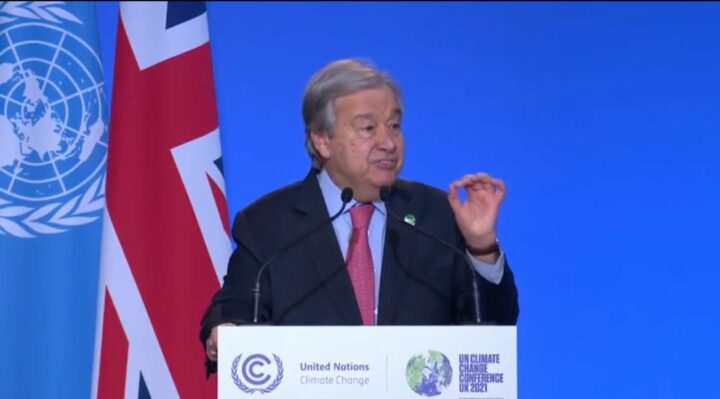Antonio Guterres, United Nations secretary-general, says the world has shifted from the era of global warming to that of global boiling.
Speaking at the UN Headquarters on Thursday, Guterres said the new data from the World Meteorological Organisation (WMO) and EU-funded Copernicus Climate Change Service (C3S), confirmed July as the hottest month in the history of humanity.
He said it is time to “turn a year of burning heat into a year of burning ambition and accelerate climate action”.
“Humanity is in the hot seat. Today, the World Meteorological Organisation and European Commission’s Copernicus Climate Change Service are releasing official data that confirms that July 2023 is set to be the hottest month ever recorded in human history,” he said.
Advertisement
“We don’t have to wait for the end of the month to know this. Short of a mini ice age over the next days, July 2023 will shatter records across the boards.
“According to the data released today, July has already seen the hottest three week period ever recorded. The three hottest days on records and the highest ever ocean temperatures for this time of year.
“The consequences are clear, and they are tragic – children swept away by monsoon rains, families running from the flames, workers collapsing in scorching heat.
Advertisement
“For vast parts of North America, Asia, Africa and Europe, it’s a cruel summer for the entire planet; it is a disaster. And for scientists, it is unequivocal humans are to blame. All this is entirely consistent with predictions and repeated warnings. The only surprise is the speed of the change. Climate change is here, it is terrifying and it is just the beginning.
“The era of global warming has ended, the era of global boiling has arrived. The air is unbreathable; the heat is unbearable; and the level of fossil fuel profits and climate inaction is unacceptable.”
Underscoring the need for global action on emissions, climate adaptation and climate finance, Guterres said “all actors must come together to accelerate a just and equitable transition from fossil fuels to renewables as we stop oil and gas expansion and funding and licensing for new coal, oil and gas.”
He urged financial institutions to end their fossil fuel lending and investments and shift to renewables instead.
Advertisement
Guterres also called on fossil fuel companies to chart their move towards clean energy with detailed transition plans across the entire value chain, saying “no more greenwashing, no more deception, and no more abusive distortion of anti-trust laws to sabotage net-zero alliances”.
JULY HOTTEST MONTH ON RECORD
In a statement, the WMO said July 5,6 and 7 have become the hottest days on record with July 6 being the hottest surpassing the previous record set in August 2016.
It stated that there is a 98 percent likelihood that at least one of the next five years will be the warmest on record and a possible temporary exceeding of the 1.5°C above the 1850-1900 average.
Advertisement
“On July 6, the daily average global mean surface air temperature surpassed the record set in August 2016, making it the hottest day on record, with July 5 and July 7 shortly behind,” the statement read.
“The first three weeks of July have been the warmest three-week period on record. Global mean temperature temporarily exceeded the 1.5° Celsius threshold above preindustrial level during the first and third week of the month (within observational error).
Advertisement
“Since May, the global average sea surface temperature has been well above previously observed values for the time of the year; contributing to the exceptionally warm July.
“It is extremely likely that July 2023 will be the hottest July and also the hottest month on record, following on from the hottest June on record. According to ERA5 data the previous hottest July and month on record was July 2019. Complete ERA5 data for July will be available and published by C3S in their upcoming monthly bulletin on August 8.
Advertisement
“WMO predicts that there is a 98% likelihood that at least one of the next five years will be the warmest on record and a 66% chance of temporarily exceeding 1.5°C above the 1850-1900 average for at least one of the five years.”
Advertisement
Add a comment






